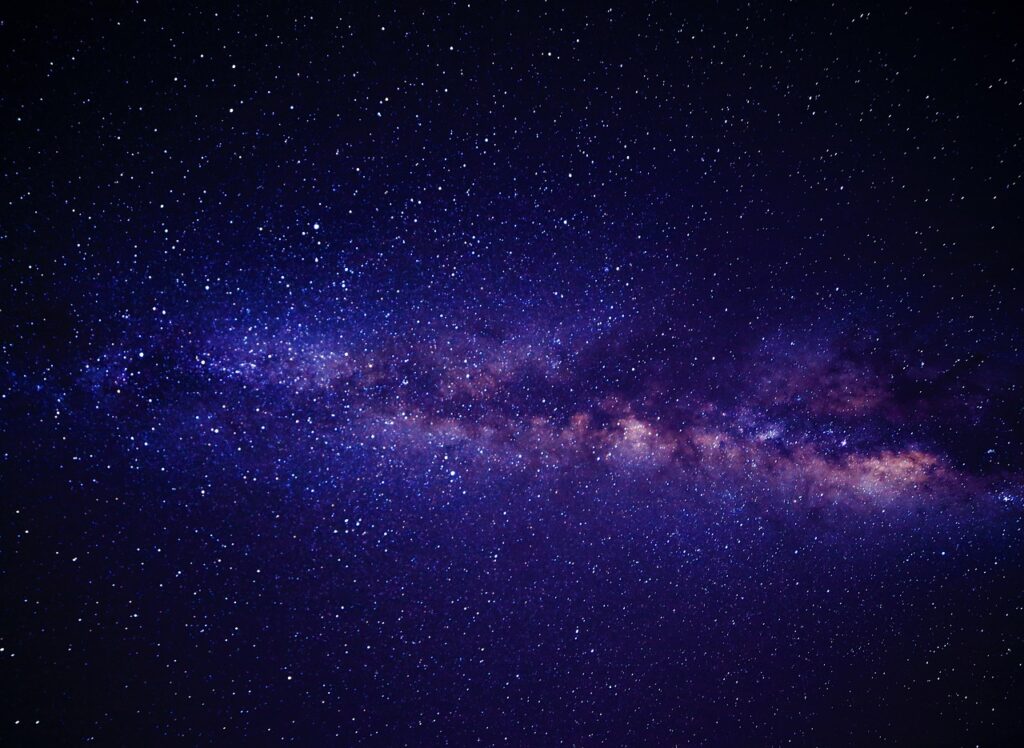Once upon a time there was a pink planet. A hydrogen shield formed the exosphere and acted as a pink lens, casting the rest of the world in a shade of rose for those looking outward into space. Hydrogen, since it is a metal, also acted as an antenna to pick up the hum of the radio waves emitted by the stars. At times, one star would flare brighter, then another, in an ever-changing drone of harmonies, not unlike the sound of chanting or of the ocean rhythmically and relentlessly urging serenity.

The land was all connected as one continent and surrounded by the ocean, but underground freshwater spouted a fountain aboveground for the planet’s inhabitants. This watered the plants and kept the animals well-cared for with no exertion required of the people. And the people were very unique: All sizes and every color of the rainbow and too many styles and variations to tell about today. The people saw themselves as stewards for the Pink Planet. They listened to the hum of the stars and looked out at the world through their rosy lens, and they lived in peace for a time.
One day, there was a disagreement between the oldest child and his parents in a particular household. They lived in tents so as to allow the stars to accompany their daily lives and their sleep, but this meant that neighboring families also witnessed the argument. The boy, Flint, was impatient and weary of inactivity. He thought he wanted some adventure, so that he could prove himself by what he accomplished. Since his parents did not know that trouble was already on the way, they argued that there simply was no call for more than simply to be. He was, they explained, mistaken about what he was made for. He needed to be content with their simple life. What they did not say was this: They were afraid that there was something wrong with their boy. The thought showed on their faces and in their voices, and the boy left his family’s tent feeling very alone.
In his anger, he kicked stones out of his path and strode away from his people’s encampment, all the while staring at the ground. His angry thoughts deafened him to the hum of the stars. Looking on in concern, the stars flared as they were able, trying to regain his attention. He heard nothing but the angry march of his own steps and the buzz of his ruminations. However, the flare of one star glinted off a stone in the ground, causing a new thought and a very new feeling to pass through the boy.
He saw that the stone reminded him of the stars, and he saw that he could own it. He did not have to be a caretaker for a universe mostly out of reach. He could be the master and owner of the part he really cared about, he thought. And in his pride, he embedded that stone into his skin. Over time, he would embed many, many more, and he renamed himself Glint.

Many similar arguments detonated that night, sending many young people from the encampment and out into the darkness and the loneliness of their anger. No one understood what was in the hearts of these children or how things had gone so wrong. How had the older generation failed to pass on their old ways of contentment? All they wanted was for their children to be happy. Why were the children so restless?
The young people dug, never looking up, exerting themselves as their parents never had, spending this new energy that no one could trace to an origin. They wanted to conquer, to dominate. And so they dug, and they embedded stones into their skin until they reflected the glow of the stars. And they flattered themselves to think that they were becoming stars themselves. Some of them even theorized that they would one day take the place of the stars. Then they would be the ones to teach the world.
After some time, the diggers had tunneled their way down, where a particularly numerous amount of shiny stones were deposited together. The tunnel went down so far that the temperature changed, sunlight never reached the bottom, and the sound of the stars was completely muted. In that black chasm, the diggers brought lanterns and dug around the clock without any reference for day or night. They were obsessed with the goal of becoming stars, and they continued their activity, even once their skin had seated as many stones as they could hold and still support life. The diggers were becoming sick.
This is when the diggers noticed a rumbling that was not their own. Their shovels froze as they listened and felt that rumble under their feet. Each digger looked at the others to confirm that they were not the only ones feeling this, hearing this. Something was coming and would reach their tunnel soon. Something was coming up from below. Those young people scurried back to the surface.
Following them to the surface were swarms of giant cockroaches as long as the arm of one person. The cockroaches were seeking flesh. The first ones tried to bite the diggers but were hurt instead, on account of the stones embedded in the diggers’ skin. Still, the diggers recognized that these creatures were evil and needed to be destroyed. All of the anger and restlessness found a worthy outlet, and the diggers became fighters.
Some of the giant roaches fled the melee and found their way to the encampment. The people here were older, content, unaccustomed to running, and unprotected by any stones in their skin. These softer people cried out, and their suffering found ears. The diggers raged to the scene, roaring and placing themselves between the roaches and their estranged family members. They used their stony skin and their digging tools, and they fought for their families. Then the fighters became warriors with love in their hearts.
The battle that day was a terrible one. Peace did not immediately follow upon victory. Much had been lost, and people on both sides, the older and younger generations, were each inclined to blame one another for their grief. The older folks argued that the roaches surfaced where they did because they heard the diggers tunneling. Perhaps they would have stayed hidden away in their world below ground forever, if only the diggers had been content. But no, the roaches had surfaced so near the encampment of vulnerable people, because the diggers had been selfish. The older folks wanted their hardened children to pay for this.
The younger people argued that the roaches would have surfaced eventually, and it was only because some people wore armor and had gained strength that they had been able to defend themselves at all. Digging was essential to being prepared for the roaches, which would have inevitably faced them one day.
The elder of the community, no one now remembers his or her name, only that the elder stood on a high rock, banging a staff into the rock, demanding quiet and attention, but no one heard. Out in the low clearing interspersed with light tents, the people talked over one another, accusing without listening. No one could hear the stars at all. And no one could hear the larger swarm of cockroaches scurrying towards them until after those roaches crested the hilltop, outlining the horizon in black and filling all ears with the rubbery scissoring of their many legs.
The rumbling knocked some people to the ground. The people looked down, too distracted to mind the roaches, afraid of what could be causing so much movement beneath them. The motion did not make sense until the earth broke beneath them, separating the people from the roaches. Some of the warriors who had rushed to be at the front were left to jump over the chasm, while others were left behind to defend against lines of advancing roaches, and other groups splintered away in all directions.
The shattering divide occurred at the fresh water spring that had watered their valley. It spidered out from there, creating several groups of people, who floated away from one another on the ocean, some of whom survived, all of whom were lost to one another for a long, long time. When the first day was turning to night, they could hardly see one another’s shores. Over time, the hydrogen shield broke up and dissipated as well, so the people lost their council of the stars and the rosy outlook they once had.
Eventually, the peoples moved on and forgot much of their history from before the Great Divide. Homogenous groups of people far less varied developed on each of the continents. When they met again, they had no memory of being related, and of course, denied their obvious similarities and fought time and time again.
Once they came of age to visit the stars, they had only a glimmer of a memory that the luminaries had once taught them something profound, something never quite put into words. No one realized that the stars were still speaking, even as people used the lights for navigation. They became a people who only trusted themselves and what they could control, and they grew accustomed to doubts and fears. Only the rarest among them ever glimpsed contentment again.


Speaking of hydrogen, think about a heavy hydrogen atom as an illustration of The Trinity (an explosive concept : – )
https://en.wikipedia.org/wiki/Deuterium
Interesting observation! I will think about that! Thank you for reading this, Neal!